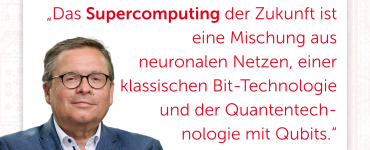In this interview, Axel Föry, Executive Vice President Strategy and Business Development at ID Quantique, explains how quantum keys protect highly sensitive data, what practical applications already exist and why companies should start using quantum encryption today.
Mr Föry, what is a quantum key and where is it used?
A quantum key is an encryption key that is transmitted using quantum physical effects. This method is used to protect highly sensitive data particularly securely, as any attempts to intercept it would be immediately recognisable. Areas of application for quantum keys include securing confidential communications in diplomacy, the military and the healthcare sector. Banks, insurance companies and critical infrastructures also rely on quantum encryption to protect data such as intellectual property – such as pharmaceutical designs or chip designs – and information on raw material resources.
For many companies, quantum technology is still uncharted territory. Why is it still important to get to grips with it today?
Quantum technology is already shaping our everyday lives through first-wave applications such as lasers, semiconductor technologies and GPS. However, the second wave will change our lives even more fundamentally. Quantum computers will be able to carry out calculations and simulations that are unthinkable or simply impossible today, especially in combination with artificial intelligence.
Another example is quantum sensor technology, which offers us new insights: Imagine if a smartphone could recognise through its camera alone how ripe a tomato is, where it was grown and whether it is truly organic. However, with every technological development comes new risks. In the next five years, there is an over 80% probability that the maturity of quantum computing technology will overcome conventional encryption. Data that is already illegally tapped today, which is transmitted via main fibre optic connections and classically encrypted, could then be decrypted.
Can you give an example of how quantum encryption is currently being used in practice or could soon be used?
South Korea already has a nationwide quantum communication network in use for the government. Singapore and other countries are following suit. China is planning to fully secure its national backbone with quantum key distribution (QKD) by next year. Some of the world’s largest banks are also already using quantum-safe methods, such as post-quantum cryptography (PQC), to protect their data.
How do you think quantum encryption will affect the security of our digital infrastructure? For which threat scenarios does it offer a suitable solution?
Quantum encryption could become our best tool against looming security risks, especially in the most vulnerable areas such as government communications, banking and critical infrastructure. If it doesn’t arrive quickly enough, there is a risk of massive security problems. I would even say: either it comes quickly, especially in the areas clippings mentioned above, or we will have a bigger problem than climate change.
Thank you very much, Mr Föry!
For more exciting insights on the topic of quantum technology join our German-language event:
“Quantum Technology – The Next Stage of the Digital Revolution” – register here and don’t miss out!





